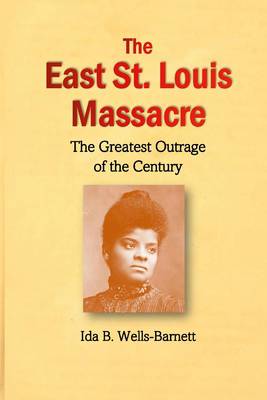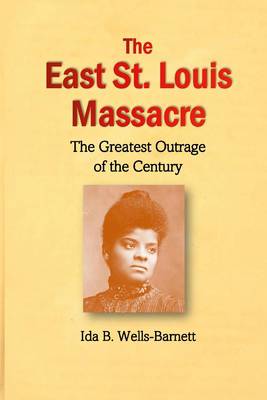
Door een staking bij bpost kan je online bestelling op dit moment iets langer onderweg zijn dan voorzien. Dringend iets nodig? Onze winkels ontvangen jou met open armen!
- Afhalen na 1 uur in een winkel met voorraad
- Gratis thuislevering in België vanaf € 30
- Ruim aanbod met 7 miljoen producten
Door een staking bij bpost kan je online bestelling op dit moment iets langer onderweg zijn dan voorzien. Dringend iets nodig? Onze winkels ontvangen jou met open armen!
- Afhalen na 1 uur in een winkel met voorraad
- Gratis thuislevering in België vanaf € 30
- Ruim aanbod met 7 miljoen producten
Zoeken
The East St. Louis Massacre
The Greatest Outrage of the Century
Ida B Wells-Barnett
Paperback | Engels
€ 11,95
+ 23 punten
Omschrijving
"Wells...provided damning descriptions of the melee that claimed one too many black lives." -Concrete Demands: The Search for Black Power in the 20th Century (2014)
"To Wells...the events at East St. Louis combined some of the worst racist elements...in three days of rioting, 39 African Americans were killed." -Ida B. Wells-Barnett and American Reform (2003)
"Her account of the riot which included interviews with riot victims documenting the violent participation of both the National Guard and the East St. Louis police, helped spur a congressional investigation." -To Tell the Truth Freely: The Life of Ida B. Wells (2009)
Who was to blame for the East St. Louis Massacre of 1917, a series of outbreaks race-related violence resulting in the deaths of from 40 to 250 African-Americans? Ida B. Wells answers this question in her once government-censored 1917 book "The East St. Louis Massacre." Another 6,000 blacks were left homeless and the burning and vandalism cost approximately $400,000 ($7,982,000 in 2020) in property damage.
In describing the scene in East St. Louis, after she arrived in the aftermath of the riot, Wells writes: "No one molested me in my walk from the station to the City Hall, although I did not see a single colored person until I reached the City Hall building. I accosted the lone individual in soldier's uniform at the depot, a mere boy with a gun, and asked him if the governor was in town. When he said no, he had gone to Washington the night before, I asked how the situation was and he said, 'bad.' I asked what was the trouble and he said, 'The Negroes won't let the whites alone. They killed seven yesterday and three already this morning.'"
The ferocious brutality of the attacks and the failure of authorities to protect innocent lives contributed to the radicalization of many blacks in St. Louis and the nation. Marcus Garvey, black nationalist leader of the UNIA from Jamaica, declared in a July 8 speech that the riot was "one of the bloodiest outrages against mankind" and a "wholesale massacre of our people", insisting that "This is no time for fine words, but a time to lift one's voice against the savagery of a people who claim to be the dispensers of democracy."
In New York City on July 28, ten thousand black people marched down Fifth Avenue in a Silent Parade, protesting the East St. Louis Massacre. They carried signs that highlighted protests about the massacre.
"To Wells...the events at East St. Louis combined some of the worst racist elements...in three days of rioting, 39 African Americans were killed." -Ida B. Wells-Barnett and American Reform (2003)
"Her account of the riot which included interviews with riot victims documenting the violent participation of both the National Guard and the East St. Louis police, helped spur a congressional investigation." -To Tell the Truth Freely: The Life of Ida B. Wells (2009)
Who was to blame for the East St. Louis Massacre of 1917, a series of outbreaks race-related violence resulting in the deaths of from 40 to 250 African-Americans? Ida B. Wells answers this question in her once government-censored 1917 book "The East St. Louis Massacre." Another 6,000 blacks were left homeless and the burning and vandalism cost approximately $400,000 ($7,982,000 in 2020) in property damage.
In describing the scene in East St. Louis, after she arrived in the aftermath of the riot, Wells writes: "No one molested me in my walk from the station to the City Hall, although I did not see a single colored person until I reached the City Hall building. I accosted the lone individual in soldier's uniform at the depot, a mere boy with a gun, and asked him if the governor was in town. When he said no, he had gone to Washington the night before, I asked how the situation was and he said, 'bad.' I asked what was the trouble and he said, 'The Negroes won't let the whites alone. They killed seven yesterday and three already this morning.'"
The ferocious brutality of the attacks and the failure of authorities to protect innocent lives contributed to the radicalization of many blacks in St. Louis and the nation. Marcus Garvey, black nationalist leader of the UNIA from Jamaica, declared in a July 8 speech that the riot was "one of the bloodiest outrages against mankind" and a "wholesale massacre of our people", insisting that "This is no time for fine words, but a time to lift one's voice against the savagery of a people who claim to be the dispensers of democracy."
In New York City on July 28, ten thousand black people marched down Fifth Avenue in a Silent Parade, protesting the East St. Louis Massacre. They carried signs that highlighted protests about the massacre.
Specificaties
Betrokkenen
- Auteur(s):
- Uitgeverij:
Inhoud
- Aantal bladzijden:
- 52
- Taal:
- Engels
Eigenschappen
- Productcode (EAN):
- 9781430310174
- Verschijningsdatum:
- 30/04/2022
- Uitvoering:
- Paperback
- Formaat:
- Trade paperback (VS)
- Afmetingen:
- 152 mm x 229 mm
- Gewicht:
- 90 g

Alleen bij Standaard Boekhandel
+ 23 punten op je klantenkaart van Standaard Boekhandel
Beoordelingen
We publiceren alleen reviews die voldoen aan de voorwaarden voor reviews. Bekijk onze voorwaarden voor reviews.











